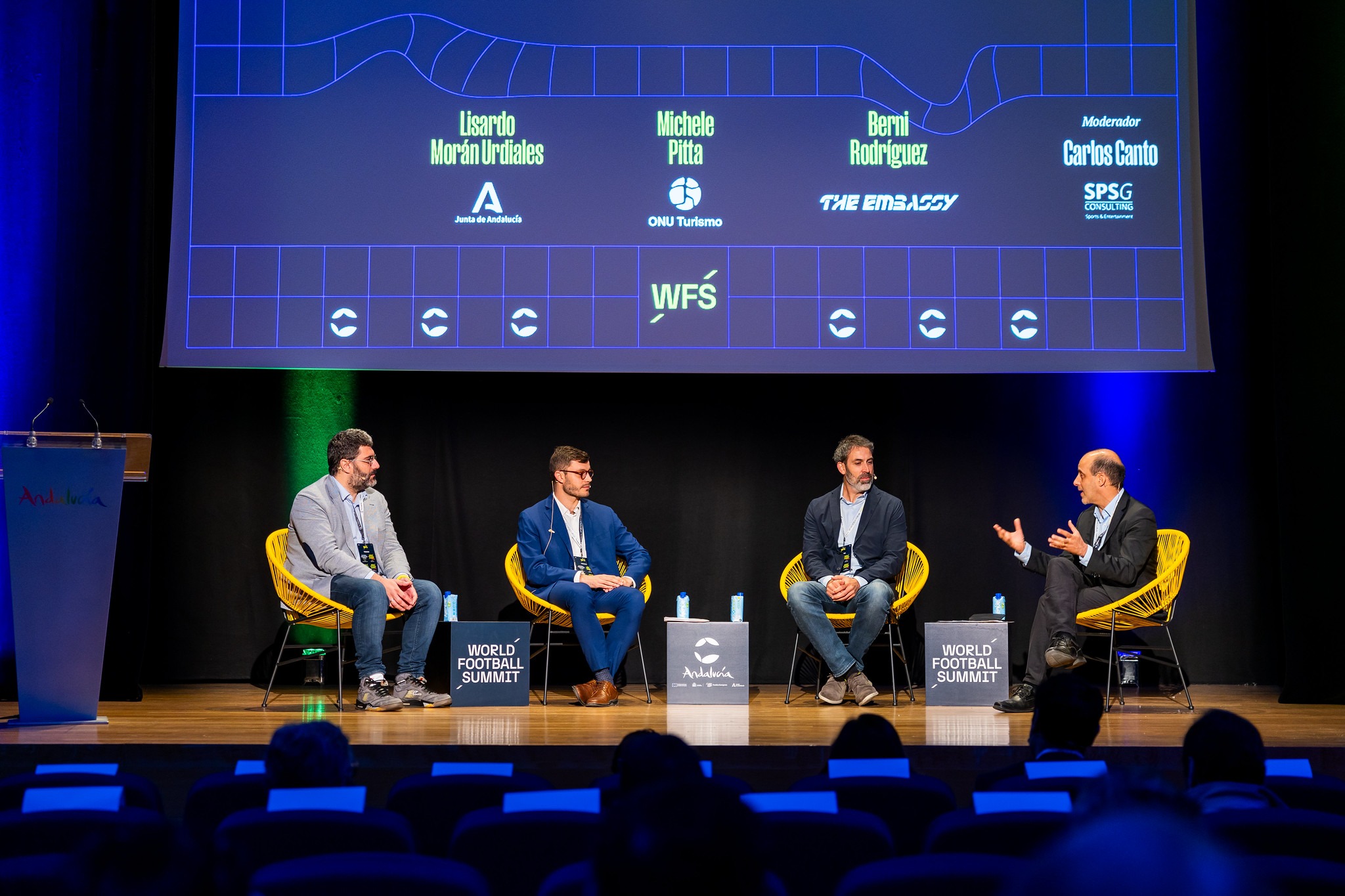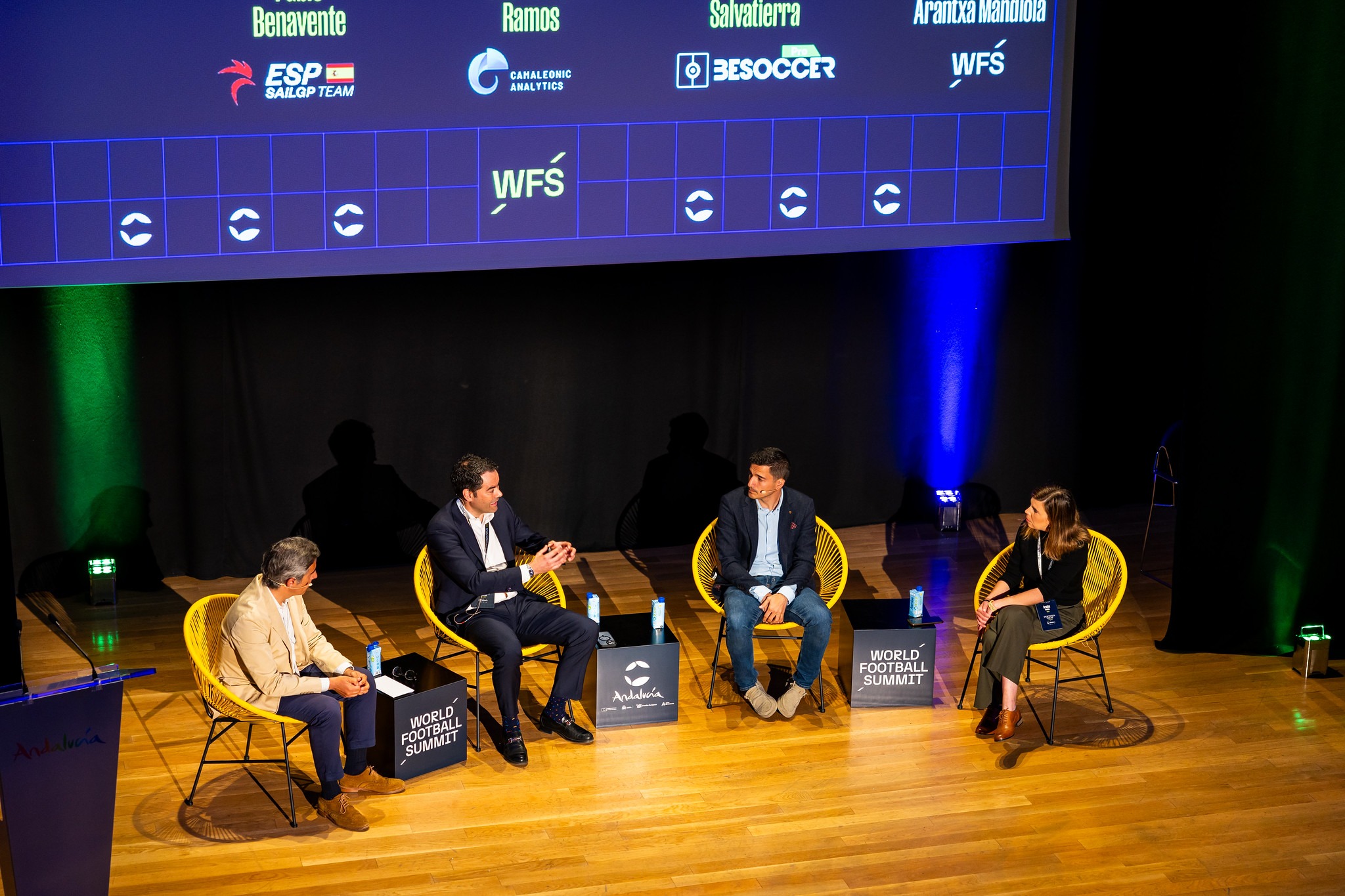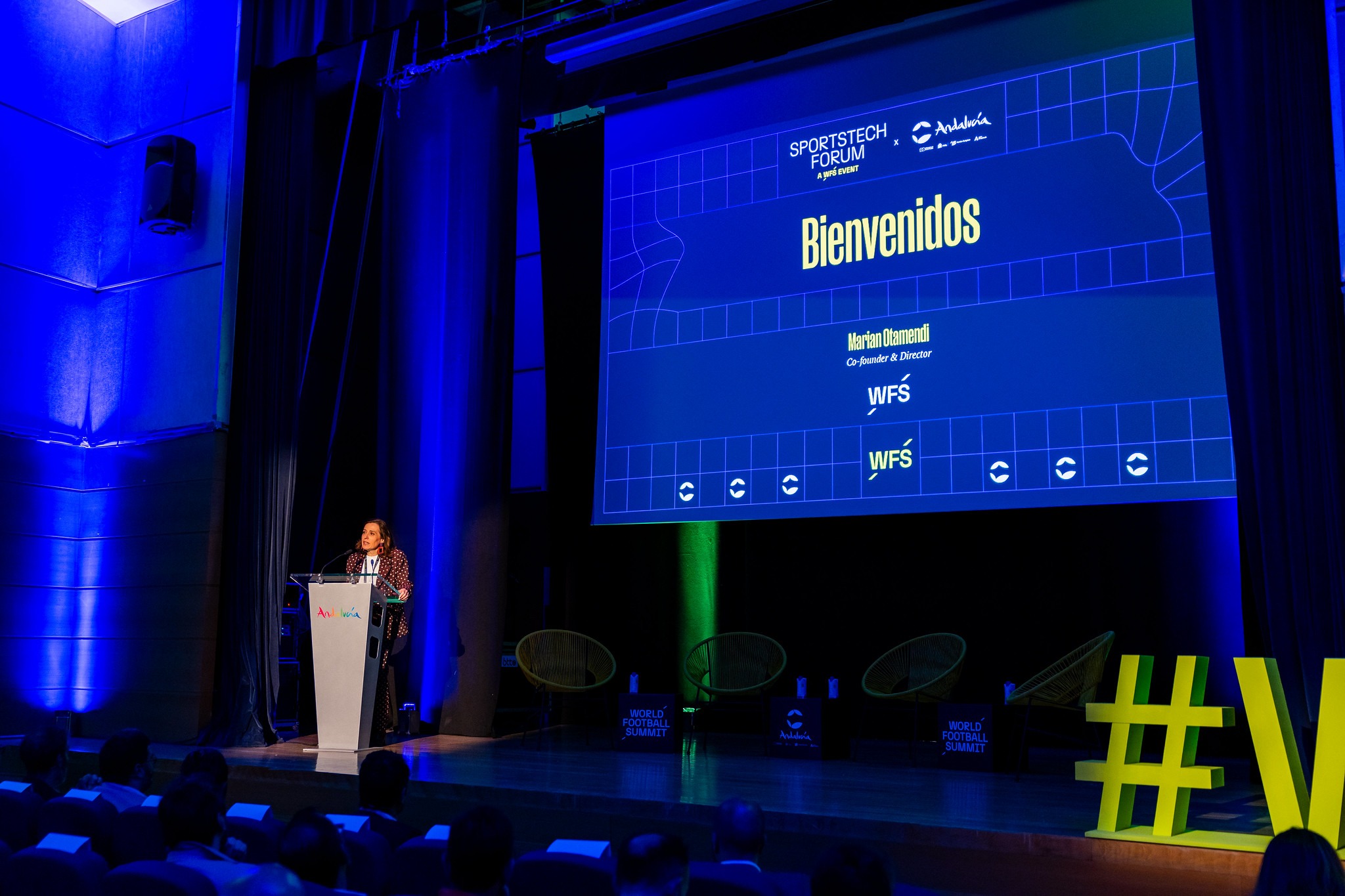Sportstech Forum, the latest World Football Summit event, gathered in Málaga the biggest players within the Andalucian sportstech ecosystem to discuss the importance of technology in the future of sports
The future of sports is synonymous with technology. The extent to which is still yet to be determined, but, by all accounts, tech is posed to impact every aspect of the sports industry: from the pitch to the offices. And here, at World Football Summit, we want to stay ahead of the game, which is why we created Sportstech Forum, a WFS event by Junta de Andalucía.
In the span of a morning and divided into four different panels, some of the most relevant voices in the Spanish and Andalusian technological ecosystems gathered together to discuss how their respective businesses are adapting and thriving thanks to the inclusion of technology in their daily activities.
However different those activities might be, they all had one thing in common: data was at the center of all of them. Information has risen as the prime ingredient for economic profit, as knowing your client better can help market your assets better, making them more palatable and desirable not only to your target audience but even to those who you did not know were interested in your product to being with.
THE IMPORTANCE OF DATA IN THE FUTURE OF SPORT
‘Thanks to the technology we have developed,’ explained Francisco Ramos, Director of South European Expansion at Camaleonic Analytics, ‘we can determine for our clients, for example, how many of their fans post images of themselves wearing sunglasses on their social media, which allows the promoter of an event to provide a specific service to the fan. That’s the detail you get with technology«.
Never before has it been possible to collect so much data on fans, which allows you to be extremely specific when offering services. However, to get there you first have to know how to use it. ‘The real revolution is “datification”,’ explained David Lopez, Head of Software Development at Sevilla FC. ‘Clubs are complex companies, where there is a lot of data. The competitive advantage is to have them well stored, structured, and clean. This is the only way to achieve the efficiency that will make the difference.
THE VALUE OF ARTIFICIAL INTELLIGENCE
This data collection comes thanks to the development we have seen in recent years of Artificial Intelligence, a resource that allows the analysis of extraordinarily large volumes of information to draw specific and concrete conclusions.
‘AI is going to be the driving force for data collection in any project three years from now,’ said Alejandro Cañestro, IT Director of Real Betis Balompié, ‘Every department has a need for technology. Moreover, this technology is always focused on data, because even if it doesn’t involve generating business, it can represent a cost saving.’

‘Artificial Intelligence helps us to process information very quickly and allows us to spend time on the things that matter,’ added Lopez, ‘And that speed and time end up being transformed into business opportunity. We have to do things fast, but we have to do them well. We have to be agile. ‘We trace the user event by event,’ he explained. ‘We dump that data into our data lake and AI helps us to automatically segment their behaviour into user groups. This way, we can impact them directly according to their needs.
THE SPORTS FAN, AT THE HEART OF THE STRATEGY
This data makes it possible to create a unique experience for the fan in a context in which, due to the generational change, it is increasingly difficult to attract the attention of the fans: ‘The challenge is not only to attract the fan with information’, said Enrique Salvatierra, Product Director of BeSoccer Pro, ‘but to keep them in your application in a context in which it is increasingly difficult to attract the attention of the football fan for 90 minutes’.
It is in this context that Spain SailGP Team was born, a new way of seeing and understanding sailing, adapted to the needs of the modern world. ‘We realised that it is quite difficult to follow a regatta,’ Pablo Benavente, its Communication, Marketing & Sponsorships Manager, told the panel. ‘That’s why, when the project was born, it was designed to be watched on streaming, with completely different rules to other sailing competitions and a lexicon that everyone could understand – there is no port or starboard, but left and right.
‘The broadcast was born from the hand of augmented reality so that the race can be understood, as you see simply key aspects of the race such as the distances between boats or the trajectories. In addition, the format of the races is extremely attractive: they are fast, last 16 minutes, and are organized close to the shore so that you can follow them live. The work we have to do is to keep building events and moments that are desirable’.
IMPROVING THE FAN EXPERIENCE
Offering an experience that is more attuned to the tastes of the sports fan also means offering a more appealing product to the consumer, which is key when selling any tangential element of the sports experience to your audience.
‘We always point out two keys to providing a better experience,’ explained Francisco Ramos from Camaleonic Analytics: ‘On the one hand, increasing the number of events or experiences to provide more services, and on the other hand, being technologically prepared to respond to the demands of an increasingly digital audience.

But to do this, first of all, you need to understand your audience beyond statistics. ‘Our obsession is with data, but first we have to be able to get to the heart, to understand what they feel,’ said Daniel Aragón, Marketing, Innovation and New Business Manager at Cádiz CF. ‘For example, we have done a lot of surveys. Before we say ‘we’re going to bring a concert to the stadium’, we survey the people we have in our control to see what they think’.
THE KEY TO THE PROFESSIONALISATION OF SPORT
The use of data, therefore, will serve as the basis for creating a better experience for the sports fan, which in turn will open the door to the professionalisation of the industry, as Octavi Onoro, Director of International Development at LALIGA, explained during his panel.
‘When we work with clubs, we give them the message that, in terms of business and growth, we have to move away from the idea that only the result matters,’ he said. ‘Success is not about the result at the weekend, it’s about the experience. The international fans of your team will not experience a win or loss at the weekend as closely, so you have to have a long-term strategy with them.
‘We analyse each club and tell them which markets have the most potential, and for that, you need to know the data first, and then you need to know how to interpret it. For example, we are helping Iraq to professionalise its football, and when we look at metrics we noticed that Iraq was the fourth country with the most downloads of the LALIGA app, and that it is being used more than in Saudi Arabia. Also, Iraq is a very young, very digital country with a very high potential growth demographic. But to get there, you have to know the data and weave strategies around it,’ Onoro concluded.
RELYING ON THE TECHNOLOGY DEPARTMENTS
However, it is important to bear in mind that all of the above stems exclusively from the IT departments, without which none of these strategies would be possible. ‘The important thing is the professionalisation of the departments,’ said Alejandro Cañestro, IT Director of Real Betis Balompié. ‘In ours, there has been a radical change and we have grown in the specialisation of all profiles: mathematicians, engineers, physicists…. We are an industry, and if we don’t have the best profiles to move forward we are not going to grow’.
‘At Sevilla FC we have a data-only department,’ explained David López, Head of Software Development at Sevilla FC. ‘We originally started with sports performance and scouting, but we realised that the legal department needed to trace players who had spent a formative period in order to be able to claim financial compensation in the event of a transfer to another team.
‘In response, we created an internal tool monitoring all player transfers and, if that transfer had a value, it had to be claimed. We made a lot of money out of it, and we realised we could export it to other clubs. Thanks to these tools, we are going to be much more optimal in all the decisions we make on a day-to-day basis and we are going to have more revenue”

